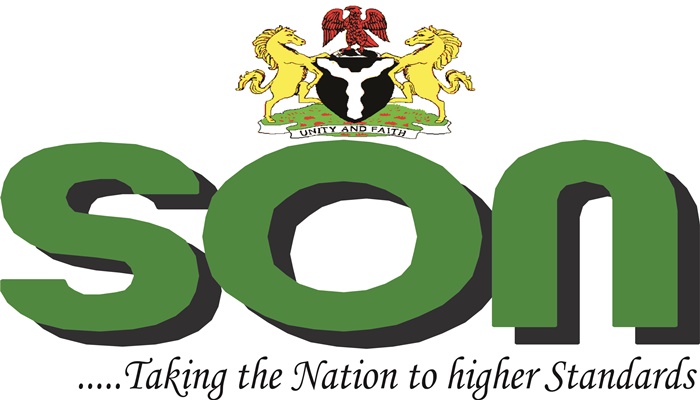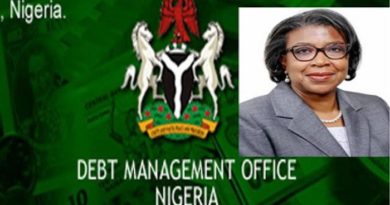SON to institutionalise standards in manufacturing sector-Aboloma
The Standards Organisation of Nigeria (SON) has put all efforts in place to institutionalise Standards in the manufacturing sector as a way to solidify its earlier efforts to totally flush fake and substandard products from the Nigerian market.
Speaking at the 2016 World Standards Day in Lagos, the Director General/Chief Executive Officer of SON, Mr. Osita Aboloma, described the Standards in production as the only factor that builds trust between the manufacturers and the consumers.
He said this year’s celebration has been themed “Standards Build Trust” in other to emphasise the trust associated with the value, safety and durability the international standards mandated on products and service.
According to him, the SON is in line with the annual celebration coordinated by the three international standardisation bodies which include the International Organisation for Standardisation (ISO), International Electrotechnical Commission (IEC) and International Telecommunication Union (ITU).
He explained that the introduction of common interpretations on reciprocal sides of a communication or transaction, standards were essential to mutual beneficial trade and resource efficient international commerce, therefore, social interaction relies on common respect for fundamental sets of norms, concepts or meanings, which international standars codify to ensure that they are accessible to all.
Aboloma reiterated that a product or service conforming to a national or international standard is imbued with a trusted symbol of quality, safety or compatibility. This, according to him, ensures role of standards in the diversity of human interconnected world, while also introduces uniformity at the interfaces where there is need to be certain to speak on the same term.
Meanwhile, the SON boss said the Organisation has put in place some marks of quality to guide consumers in purchase decisions, which also provide confidence to manufacturers and iporters on the value which their products or the services provide.
“This is in line with the theme of 2016 World Standards Day celebration. These marks are for locally manufactured as well as imported products.
“I wish to assure our teeming stakeholders that the Standards Organisation of Nigeria, as representative of the three international standardisation bodies, would continue to propergate national and international standards through adoption, and diligent implementation in both the public and private sectors. Our emphasis is on the growth and development of micro, small and medium enterprises nationwide.
“To this end, we have over the years developed competencies in various international management system standards. These include quality, environmental, food safety management among others. All are aimed at national capacity development and certification of systems for continual improvement.
“It is our vision to intensify efforts in the area of public awareness through seminars, workshops, consumer enlightenment activities and the certification of products. Internationally acclaimed standards with greater emphasis on the agro and allied sectors in line with the efforts of the Federal Government to diversify the nation’s economy, is our target.”
However, the Chairman, Nigerian Association of Small Scale Industrialists (NASSI) Lagos Chapter, Segun Kuti-George, said fake and substandard goods were not produced in Nigeria, saying all substandard and fake goods were imported into the country.
He declared that Nigerian products only lack good and internationally acceptable packaging, which has been majorly affecting Nigerian products at the international market. he said this was due to lack of equipment and modern technology.
Kuti-George further said that standards should be applied according to the level of development of each country in other to favour such countries.
The director, Standards Development, SON, Mr. Kolawole Abiola said as the apex standards body in Nigeria, SON has developed thousands of standards for the different sectors of the Nigerian economy and as representative of international standardisation bodie, it has the responsibility to propagate global standards through adoption and modified adoption for local use in all sector.
He emphasized that standards and quality remained the essential tools for economic and industrial development for any country. “We know that for most of our enlightened citizenry and stakeholders especially manufacturers, public analysts, engineer and other professionals, they conceptualise, feel and apply standards in their day-to-day activities. But for majority of Nigerians, these tools are always in their realm of imaginations as they never seize to wonder what these standards and quality are. We therefore call on all Nigerians to rise to the challenges of embracing standards and quality as a culture and a way of life.
“The time has come for us to ensure improved appreciation and application of standards for competitive advantage as this will no doubt improve quality of life and productivity as they also ensure the quality, safety and reliability of products, services and worldwide compatibility of technology, thereby ‘building trust’.”
He also appealed to Nigerians to be proud of their indigenous products and services and always recognise the crucial roles standards and quality play in the life of individuals and growth of any nation.
In speech, the Director General of National Board for Technology Incubation, Dr. Jibrin Mohammed said Standards are published documents that establish specifications and procedures designed to ensure the reliability of the materials, products, methods, and/or services people use every day, while they also address a range of issues, including but not limited to various protocols that help ensure product functionality and compatibility, facilitate interoperability and support consumer safety and public health.
Mohammed, who was represented by the South-West Zonal Coordinator/Center Manager, Dr. Julie Momah, said NBTI has the capacity, by mandate, to nurture small fledging businesses that are being tutored to conform to standards.
“We have structures that we have put in place to ensure that products and processes that are being incubated under the Technology Incubation Programme can build trust for consumers in the local and international market. We are putting ourselves out to carve a niche by strategically linking with relevant stakeholders like the Standard Organization of Nigeria and other regulators where we can sit together and build standards, and engender compliance for the Nigeria’s business ecosystem participants,” he said.





RT @WTokede: SON to institutionalise standards in manufacturing sector-Aboloma: … https://t.co/m0Jtsyy5t8
RT @WTokede: SON to institutionalise standards in manufacturing sector-Aboloma: … https://t.co/m0Jtsyy5t8
1. Thanks for the great post keep up the amazing work.